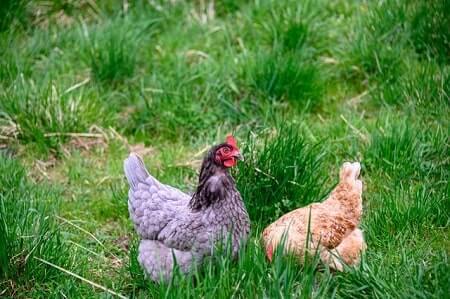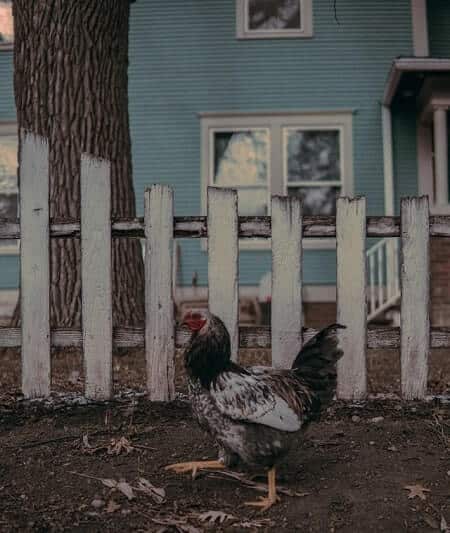If you’re looking for ways to keep your neighbor’s chickens out of your yard - or even your own chickens out of your flower beds and other areas - mothballs are one of the ways some people do this.
It’s not a method I recommend though.
Mothballs contain a high concentration of insect repellant. Both inhaling the fumes they give off, and ingesting mothballs can cause chickens and other pets or small animals some serious health issues.
Here’s why I strongly recommend you don’t use mothballs to repel chickens, and some of the safer alternatives I recommend trying:
Table of Contents
Are Mothballs Toxic to Chickens?
Mothballs are toxic to chickens, yes. I’ve read some accounts from people that have used them, and they say they’ve never had an issue of their chickens being affected.
So, if you’ve heard that mothballs are an effective way to keep chickens and other animals away from certain areas of your yard, I’m sure they can be.
For me, however, it’s not worth the risk of poisoning a chicken.
Mothballs contain insect repellents, that’s how and why they repel and kill moths, larvae, and other insects.
The common insecticides used include naphthalene, paradichlorobenzene (PDB), or camphor. Both of which are harmful to any living thing that comes into contact with them.
Some of the “pet-safe” mothballs are enclosed in a sealed container to stop pets from licking or eating them. The fumes are still very potent, however, potent enough to kill insects.
The bottom line is that you shouldn’t put mothballs anywhere chickens can come into contact with them. It’s better to be safe than sorry, no matter how desperate you are to repel them from your prized flowers or vegetable garden!
Signs of Mothball Poisoning in Chickens

If you or your neighbors have been using mothballs and you’re concerned a chicken has eaten one, here are some of the common symptoms associated with mothball poisoning in pets according to VCA Hospitals:
- Vomiting
- Weakness or lethargy
- Labored breathing
- Tremors
- Seizures
The issue when ingesting mothballs is that they will dissolve slowly releasing more poison. Within a chicken’s digestive system, it may get stuck in their crop, or worse pass into their gizzard.
If it is in the crop, there is a chance you can turn your chicken upside down and massage their crop so it falls out. Just as you would in the case of a blocked or “impacted” crop.
Related - How to use Epsom salt to help with an impacted crop.
Can You Put Mothballs in a Chicken Coop?
This is another common question I hear because mothballs are great at repelling snakes and small rodents.
These predators love sneaking into a coop at night and terrorizing chickens and stealing eggs. Using mothballs is not a good idea though for all the reasons I’ve already listed.
The fumes are going to be even more concentrated in an enclosed coop. It’s going to be far too dangerous using them inside a coop and will likely cause respiratory issues, even if your chickens can’t get to them.
The only reliable way to keep predators out of a coop in my experience is to make sure there are no entry points.
If this means securing the perimeter with wire meshing or wire cloth, that’s what you’ll need to do.
Too many backyard chicken owners get caught out by a sneaky snake, or worse, a larger predator like a raccoon. Don’t leave it to chance!
What Can I Use to Keep Chickens Away?

As I mentioned, you don’t need to resort to harmful pesticides and poisons to keep chickens away from areas of your yard or garden.
It may take a little trial and error and some patience on your part, but the best ways to keep chickens at bay are:
Putting up a Fence
This method involves the most work, but it’s by far the most effective way to keep chickens out of a flower bed or away from sections of your yard.
It doesn’t always have to be a high fence, especially if you use some other repellents too. About a foot high usually works. Most chicken breeds will not hop or fly over fences, they’ll take the hint that it’s a no-go zone.
Using Scents Chickens Dislike
Chickens do not have the most powerful sense of smell, but there are some scents that they clearly dislike.
Some of the scents I’ve read people swearing by include:
Citrus peels - Mostly lemon and lime peels. You can also use citrus juice or place segments of the fruits. In my experience, this is only effective against some chickens and it’s a short term solution.
Spices - I have a friend who uses leftover spices like black pepper, curry powder, and cayenne pepper and says it works a treat. You do have to keep adding new pepper though, and wet weather removes the scent.
Herbs - This is a tricky one because chickens will happily munch some herbs while they’re repelled by others. Try testing which herbs your chickens don’t like, usually strong-smelling ones like mint, lemon balm, and lavender.
Motion Activated Devices
This is another method that requires a little work and money but is very effective. Chickens respond well to sudden movement and shock tactics though.
I’m not suggesting you do anything that will shock a chicken to the point of stress, of course. Something like a motion-activated sprinkler or a device that makes a sudden noise should do.
Related - How to keep chickens off your porch.
In Summary - Will Mothballs Keep Chickens Away?
Mothballs may keep chickens away from your vegetables, flowers, and other areas you don’t want them to go - but you risk poisoning them!
As I explained in this article, there are less harmful ways to deter or repel chickens. I recommend trying these before using harmful pesticides and chemicals.
Resources
Image credits - Photos by Brianna Santellan, Etienne Girardet, and Morgan Vander Hart on Unsplash
Mothball toxicity - VCAHospitals.com




